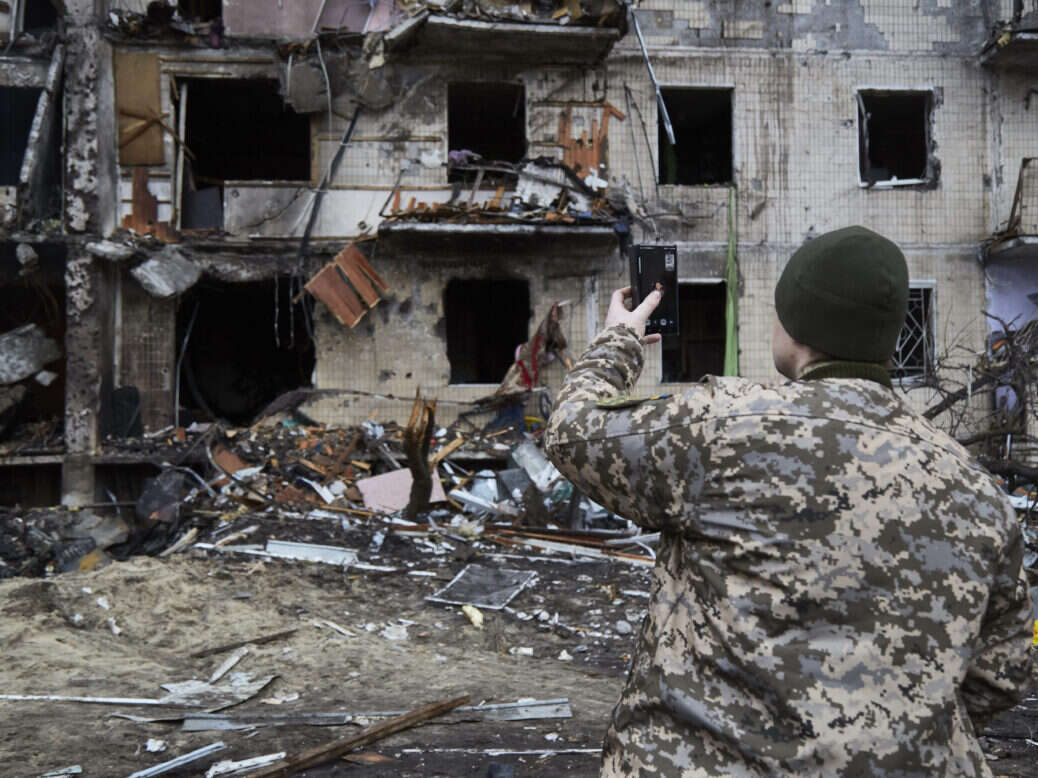
Three Ukrainian news outlets are partnering with a non-fungible token (NFT) platform to sell access to exclusive content to help them keep reporting during the war in their country.
The Ukrainian-language publishers have seen their prominence grow as international attention fixates on Russia’s invasion of the country.
The three outlets – Ukrainska Pravda, Novoye Vremya and NGO broadcaster Hromadske – hope to sell a limited number of “NFT keys” giving holders access to a digital vault of curated and original content.
There will be 10,000 of the keys available in total for $99.99 (£75) each, in a partnership with NFT platform Vault which allows creators to curate content only visible to keyholders.
An NFT is a certificate of ownership over a digital object, for example a picture or a video. NFTs differ from conventional certificates because, like cryptocurrencies, their ownership is recorded in a blockchain – a public, digital ledger which is effectively impossible to forge or manipulate.
According to Vault, each key “will provide access to content from the publication’s brave team of journalists, photographers, and editorial team, including photos and videos, links to stories and recommended readings, a special weekly email blast for supporters, and more”.
The company said proceeds from the sales will “directly support the media organisations”. If all the keys sell, the publications will raise $999,900 (£750,000) between them.
Sevgil Mysayeva, editor-in-chief of Ukrainska Pravda, claimed that in the first few days of the invasion his publication “was the second most popular website in Ukraine after Google.
“About eight million people around the world read us every day. We feel our responsibility to inform the world about the current situation in Ukraine truthfully and in time.”
Ukrainska Pravda was co-founded in 2000 by political journalists Olena Prytula and Georgy Gongadze, the latter of whom was murdered shortly afterward.
The New Voice of Ukraine, which also publishes in English, was responsible for publicising the now-viral video of a Ukrainian man purportedly disposing of a mine while puffing on a cigarette.
A Ukrainian in Berdyansk spotted a mine on the road and didn't wait around for a bomb disposal unit – at great risk to life and limb, he removed the mine, clearing the way for the Ukrainian military. pic.twitter.com/iC9ZTrixlC
— The New Voice of Ukraine (@NewVoiceUkraine) February 27, 2022
Nonprofit Hromadske runs television and radio channels as well as a website in Ukrainian, Russian and English. Poynter reported in July 2020 that 95% of its income comes from international donors including the UK’s Foreign and Commonwealth Office.
The three publishers are not the first to experiment with NFTs, although they may be the first to combine the innovation with what is in effect a paywall.
Quartz sold an NFT of an article for the Ethereum equivalent of $1,800 (£1,350) in March 2021. In June the same year, US local news giant Gannett sold its first NFT.
Time magazine, after initially dipping its toe into the crypto-waters with NFTs of a past cover, has since set up a lucrative NFT shopfront in which it sells Time-branded third party art. The magazine confirmed to Press Gazette in January that it had made at least $10m (£7.5m) in nine months from “web3” (i.e. blockchain) ventures.
And the Associated Press announced in January it would sell selected photographs as NFTs – only to be chastised after posting a tweet promoting an NFT depicting an overcrowded migrant boat making a dangerous Mediterranean crossing.
The Ukrainian government itself floated the notion of selling NFTs on Friday, although sales do not appear to have since commenced.
The NFT keys can be bought from Vault’s website by users that have the relevant crypto wallet (Vault uses the Solana blockchain). For those who do not, they can be purchased on Vault’s app using Apple Pay.
Separately, a Go Fund Me for the leading English-language Ukrainian news outlet The Kyiv Independent has raised almost £1.2m as of 7 March. Another, named “Keep Ukraine’s media going” and raising funds for outlets including Ukrainska Pravda, has drawn in almost £800,000. Novoye Vremya is soliciting donations directly.
Picture by Pierre Crom/Getty Images
Email pged@pressgazette.co.uk to point out mistakes, provide story tips or send in a letter for publication on our "Letters Page" blog
